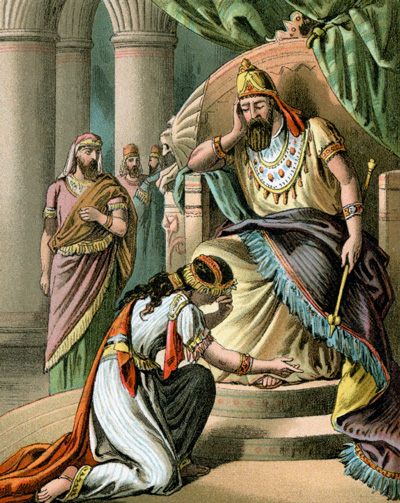Purim and the Blame Game
Permanent link All Posts
Esther beseeches King Ahasuerus to revoke his decree against the Jews
If someone pushed a button that released a fleet of nuclear missiles all over the United States and then quickly shot down each one saving everyone from utter destruction, would we call them a hero? Would everyone cheer for joy at their "savior" who saved them from imminent death and destruction and appoint them as the leader of our people for his great care and love of our nation?
No, we'd lock them up! The nerve of them to put us all through the horrifying traumatic experience of potentially we were all going to die! Who cares if they stopped it? It's their fault it happened!
All of this sounds very logical. Then we come to the holiday of Purim. We're all familiar with the story how Haman (Booo!!!) wanted to wipe out the Jews. He set up a date that every Jew in the entire land of Persia was going to be killed. Then Mordecai and Esther make this unbelievable divinely staged rescue of the entire nation, and everyone is saved.
But wait one minute -- we're skipping one step. The story actually says, toward the beginning, "When Haman (minor egomaniac) saw that Mordecai (our beloved protagonist) did not bow down and prostrate himself before him (serious narcissism issues going on), Haman was filled with rage (the ancient anger management groups weren't helping) … so Haman sought to destroy all the Jews throughout the entire kingdom …"
Wait a minute? The whole stage of destruction was set by our beloved hero? Yup. And we celebrate his victory for the Jewish people of stopping this destruction. Wasn't it all his fault?
We had another moment of blame opportunity in our history where things didn't go so well, all the way back in the beginning of the Torah. A quick recap: G-d says, "Don't eat the fruit." Snake says, "Eat the fruit." Eve eats. Adam eats. G-d confronts them, "Adam, what happened?" Adam says, "It was the woman." G-d says, "Eve, what happened?" Eve says, "It was the snake." And everyone gets punished happily ever after.
Why were they punished? Weren't they just pointing out the truth?
The difference between these two stories is all about taking responsibility. Adam and Eve had a choice not to eat, but they blamed others for their misbehavior. They didn't accept responsibility and they were punished.
In the story of Purim, the Jewish people could easily have shirked their responsibility for this decree of destruction and blamed Mordecai. But let's look a little deeper. Haman was angry because Mordecai wasn't bowing down. Why wasn't he bowing down? The Talmud tells us that Haman wore an idol around his neck. Everyone else acquiesced. Everyone bowing down was inevitably bowing to an idol, which constituted a complete abandonment of the most basic tenet of Judaism, our belief in one G-d. That belief was being put to the test. Mordecai was the only one who actually passed it.
Deep down, everyone knew this truth. Instead of covering up their angst and fears with blame, they took responsibility for their behavior They recognized that their bowing down was an abandonment of their faith and heritage. The Jewish people accepted responsibility and realized it was incumbent upon them to preserve Judaism for all future generations. Subsequently Mordecai and Esther led them toward a path of teshuvah, which literally means "return" but is better understood to mean acceptance of responsibility and a commitment to change.
This is a beautiful lesson of Purim. We have two ways to approach our challenges in life: We can look at our difficulties and complain about all the challenges we see, or we can accept responsibility for our reality and make a commitment to change just like our ancestors did.
There is a fantastic opportunity for anyone who wants to enjoy and experience the Purim spirit this year in Chicago. Join us at the Downtown Purim Lunch and Learn at noon on Thursday, March 24 at JUF building, 30 S. Wells St. There will be a reading of the Scroll of Esther, accompanied by a slideshow with translation, and insights to help us internalize the deep messages and lessons of our Jewish heritage.



.jpg)



